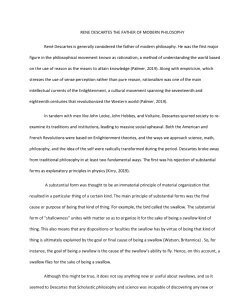RENE DESCARTES THE FATHER OF MODERN PHILOSOPHY René Descartes is generally considered the father of modern philosophy. He was the first major figure in the philosophical movement known as rationalism,
RENE DESCARTES THE FATHER OF MODERN PHILOSOPHY René Descartes is generally considered the father of modern philosophy. He was the first major figure in the philosophical movement known as rationalism,
RENE DESCARTES THE FATHER OF MODERN PHILOSOPHY
René Descartes is generally considered the father of modern philosophy. He was the first major figure in the philosophical movement known as rationalism, a method of understanding the world based on the use of reason as the means to attain knowledge (Palmer, 2019). Along with empiricism, which stresses the use of sense perception rather than pure reason, rationalism was one of the main intellectual currents of the Enlightenment, a cultural movement spanning the seventeenth and eighteenth centuries that revolutionized the Western world (Palmer, 2019).
In tandem with men like John Locke, John Hobbes, and Voltaire, Descartes spurred society to re-examine its traditions and institutions, leading to massive social upheaval. Both the American and French Revolutions were based on Enlightenment theories, and the ways we approach science, math, philosophy, and the idea of the self were radically transformed during the period. Descartes broke away from traditional philosophy in at least two fundamental ways. The first was his rejection of substantial forms as explanatory principles in physics (Kirry, 2019).
A substantial form was thought to be an immaterial principle of material organization that resulted in a particular thing of a certain kind. The main principle of substantial forms was the final cause or purpose of being that kind of thing. For example, the bird called the swallow. The substantial form of “shallowness” unites with matter so as to organize it for the sake of being a swallow kind of thing. This also means that any dispositions or faculties the swallow has by virtue of being that kind of thing is ultimately explained by the goal or final cause of being a swallow (Watson, Britannica) . So, for instance, the goal of being a swallow is the cause of the swallow’s ability to fly. Hence, on this account, a swallow flies for the sake of being a swallow.
Although this might be true, it does not say anything new or useful about swallows, and so it seemed to Descartes that Scholastic philosophy and science was incapable of discovering any
René Descartes is generally considered the father of modern philosophy. He was the first major figure in the philosophical movement known as rationalism, a method of understanding the world based on the use of reason as the means to attain knowledge (Palmer, 2019). Along with empiricism, which stresses the use of sense perception rather than pure reason, rationalism was one of the main intellectual currents of the Enlightenment, a cultural movement spanning the seventeenth and eighteenth centuries that revolutionized the Western world (Palmer, 2019).
In tandem with men like John Locke, John Hobbes, and Voltaire, Descartes spurred society to re-examine its traditions and institutions, leading to massive social upheaval. Both the American and French Revolutions were based on Enlightenment theories, and the ways we approach science, math, philosophy, and the idea of the self were radically transformed during the period. Descartes broke away from traditional philosophy in at least two fundamental ways. The first was his rejection of substantial forms as explanatory principles in physics (Kirry, 2019).
A substantial form was thought to be an immaterial principle of material organization that resulted in a particular thing of a certain kind. The main principle of substantial forms was the final cause or purpose of being that kind of thing. For example, the bird called the swallow. The substantial form of “shallowness” unites with matter so as to organize it for the sake of being a swallow kind of thing. This also means that any dispositions or faculties the swallow has by virtue of being that kind of thing is ultimately explained by the goal or final cause of being a swallow (Watson, Britannica) . So, for instance, the goal of being a swallow is the cause of the swallow’s ability to fly. Hence, on this account, a swallow flies for the sake of being a swallow.
Although this might be true, it does not say anything new or useful about swallows, and so it seemed to Descartes that Scholastic philosophy and science was incapable of discovering any
